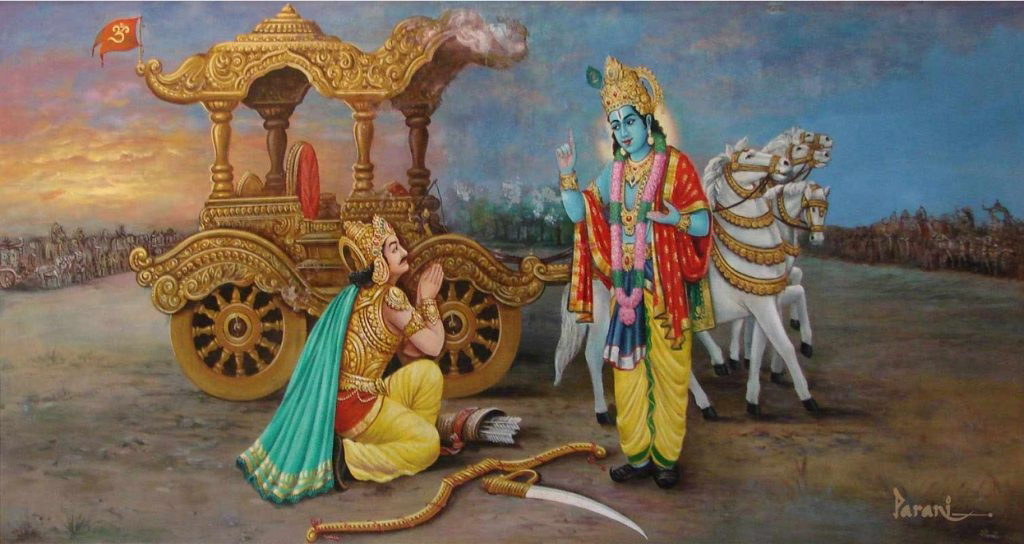The Bhagavad Gita | Chapter 12 : The Yoga of Devotion |
Summary
Arjuna sets the chapter's question by asking whether it is better to have devotional love for Krishna or for the less tangible, unmanifest God. Krishna replies that both routes will lead to understanding but recommends devotional love for Krishna's personification in the Gita for embodied beings. Worshipping Krishna in this concrete form gives worshippers a clear focus, he explains. Worshipping the vast God as the essence permeating all things will eventually lead devotees to understanding, but this form of worship involves more work. Krishna insists that meditating wholly on Krishna will lead a person to him. If such meditation is not possible, then living a life devoted to Krishna will also bring a person to Krishna in the end.
Krishna instructs Arjuna how he might become perfect in yoga. By meditating and concentrating solely on Krishna, one will become loved the most by Krishna. Krishna brings up the importance of single-minded concentration, for the yogi "with a mind / fully absorbed, one-pointed / ... will live within me, forever." This is the way to free oneself from the cycle of death and rebirth. If a person cannot do this successfully, he adds, then the path of devotion through direct action is another way to achieve success. If this doesn't work, Krishna recommends the person concentrate on detachment, or indifference to the results of their actions. Krishna claims that a person who demonstrates "kindness / ... who is always serene, / unmoved by pain or pleasure" is the one he loves best. Thus, the one who shows equanimity, no matter what the circumstances, is most loved by Krishna.
Analysis
This chapter deliberates between bhakti yoga, or love for a personal god, and worship of the unmanifest God, through intense study and meditation. Krishna advocates primarily for devotional love, arguing this is an easier and more focused path. Bhakti yoga also is more directly tied to karma yoga, or the yoga of action. Krishna teaches Arjuna that devotional love can be expressed by imbuing all action with devotional worship. The path of understanding through study and meditation provides a path to union with the unmanifest form of God, but it is more arduous work.
All are routes to the same end: freedom from the endless cycle of death and rebirth. Krishna stresses it is simpler to focus worship and devotion on him as a relatable deity rather than meditating on God in the unmanifest form. Krishna tells Arjuna that the path of those meditating on the unmanifest "is much more arduous / because, for embodied beings / the Unmanifest is obscure." Without a face or a shape to put on God, it is more difficult to focus one's meditation and worship. Worshipping Krishna's manifestation of God, however, allows a person to find a more direct and relatable channel for their devotion.
Krishna fully describes the person he loves most. In the yogic tradition, regardless of the path chosen, the devotee will demonstrate ways of being in the world that reflect inner balance and goodness. The successful person of yoga will show love and compassion for everyone equally and will have a calm attitude of detachment to the joys and sorrows of life. The devotee who is indifferent to "grief / and desire, good and bad fortune— / that man is the one I love the best," Krishna reveals.
Application part in human affairs
1. Devotional Love in Action:
Applying the concept of devotional love to Krishna in everyday life involves imbuing all actions with a sense of worship and devotion. This means approaching tasks with sincerity, love, and a recognition of the divine in each action. Whether at work, home, or in the community, individuals can infuse their responsibilities with a spirit of devotion, contributing to a more compassionate and purposeful existence.
2. Simplified Focus:
Krishna's emphasis on worshipping a personal deity provides a practical and focused approach to spirituality. In human affairs, individuals often find it easier to connect with a tangible, relatable concept. Applying this, people can cultivate a personal relationship with their chosen form of the divine, making their spiritual journey more accessible and meaningful.
3. Path of Equanimity:
Krishna's description of the person he loves most highlights the importance of equanimity in the face of life's dualities. In human interactions, individuals can strive to maintain a calm and balanced attitude, remaining unswayed by external circumstances. This approach fosters resilience, compassion, and a capacity to navigate challenges with grace.
4. Integration of Yoga Paths:
The chapter suggests that devotional love is closely tied to the path of action (karma yoga). In human affairs, this translates to aligning one's actions with a higher purpose, incorporating ethical principles into daily life. The integration of devotional love and righteous action becomes a practical guide for individuals seeking spiritual evolution while actively participating in the world.
5. Simplicity in Worship:
Krishna's advice on the challenges of meditating on the unmanifest underscores the simplicity of a tangible form of worship. In human affairs, individuals can find solace and connection through straightforward practices that resonate with them personally. This might involve rituals, prayer, or acts of kindness that symbolize their devotion.
6. Detachment and Serenity:
The emphasis on detachment from desires and outcomes echoes in human relationships and endeavors. By practicing detachment, individuals can navigate successes and failures without being unduly affected. This attitude promotes resilience, humility, and a genuine focus on the journey rather than being overly attached to specific outcomes.
In essence, the application of Chapter 12 in human affairs encourages a holistic approach to spirituality, integrating devotion, ethical action, and a serene mindset. By infusing daily life with the principles of devotional love, individuals can navigate the complexities of the world with grace, contributing positively to their own well-being and the well-being of those around them.
कृष्णम् वन्दे जगद्गुरुम्🙏



Comments
Post a Comment